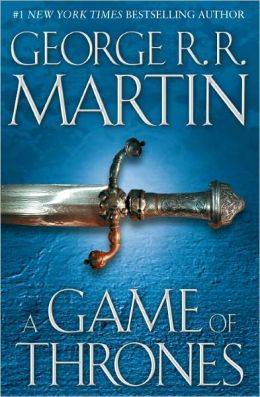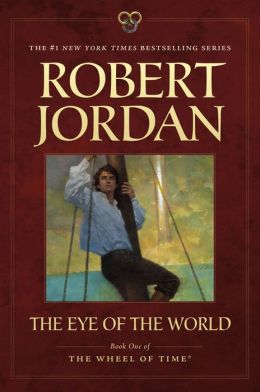Weekend Update: Epic Fantasy and the Series That NEVER Seem To End

The other morning, I had a 6 am epiphany. Of course, being 6 am, it may not be so much an epiphany as it was an interesting thought.
I've made the conscious decision to catch up on George R.R. Martin's A Song of Ice & Fire series. Right now, I'm working on A Dance With Dragons. I was Skyping with a friend of mine the other day and she's also caught up on the series and we were talking about some of the problematic issues (pacing, where it's all going, etc), and I mentioned that once Martin's series is (if it is) completed, you could use the books as a college course called "How to Write and How Not to Write Epic Fantasy." And for those of you who've read Martin or even watched the show, this should make sense: Martin does a lot of things right. But in both writing and publishing schedules, there's also a lot of things to learn from.
The pacing is a concern because the fear that we won't get an end (or in my friend's case, that she and her husband might kick the bucket before the end is published) is a very real one. Look at what happened with Robert Jordan. While I've never read the Wheel of Time series (and no, I really don't have an inkling to do so), Jordan's death really threw epic fantasy fans in a tizzy: fans of the series wondered how in the world they'd ever get an ending (something they finally have as of this year, thanks to Brandon Sanderson), and other epic fantasy readers wondered if we might be seeing the same fate for George R.R. Martin and A Song of Ice & Fire.
All of this is what got me thinking when I woke up, thanks to the cat, and couldn't go back to sleep: the nature of epic fantasy, and how these big name writers are writing them, and how it's a very real, legitimate concern, that the project won't be finished and said writers will kick the bucket.

Which got me thinking about another epic fantasy writer. One who's been publishing his original fantasy series since the late seventies and has 24 books published and more coming. One who's name just doesn't come up very often unless a book blogger is listing latest releases for the month.
That writer is Terry Brooks.
A few disclaimers: I have no nostalgia for this series. I didn't start reading it until 2002, and I stopped reading it in…. hell, I don't know. 2004? 2005? And I'll be honest, I stopped reading because I'd reached a saturation point: I was so familiar with Brooks' world and style that I found his surprises predictable and therefore unenjoyable. I was tired of having something that was supposed to be a BIG MYSTERY for the reader, but already knowing what the mystery was because Brooks' works are so choreographed they can be transparent. So I don't want to say that Brooks is a better "writer" than, say, George R.R. Martin (I can't compare to Jordan) by any means, though it's probably fair to say that Martin has his strengths and weaknesses, and Brooks does too. It's just that Brooks' weaknesses finally made me stop reading.
But while Brooks isn't very popular because his series, at least in the seventies, was pretty much a blatant rip-off of Tolkien, he came onto the fantasy scene at the right place at the right time. He does have a career, and whatever your thoughts are on his fiction or writing style, I sure wouldn't turn up my nose at his royalties.
The epiphany I had, aside from realizing that NO ONE TALKS ABOUT HIM, was simple: he's got a long-running fantasy series, but do any of his readers really worry he's going to kick the bucket before it's done?

I think not, and I'll tell you why: it's because he's written his series in chunks. In a set of stand-alone and trilogy-sized chunks that tell complete stories before the next stand-alone/trilogy comes along. I stopped reading at the High Druid of Shannara trilogy, but one thing I admired is that Brooks' story arcs were almost always separated by a generation or two. He was writing, in a sense, a living history of his world, rather than focusing on the same characters for several books at a time.
Of course, this observation is limited to epic fantasy. After all, urban fantasy focuses on the same characters for several books at a time, but those authors tend to produce a book per year, and none of those books are doorstoppers. And I know: technically, Martin only has five novels in his series, but when you add up the pages, I think you could get about 3 books (page count) per one of George's books, which would, based on page count, make the series about fifteen books to date.
And obviously, there are a TON of epic fantasy writers who aren't talked about. I'm not trying to say Brooks is under-appreciated, because if he's not being talked about, there are plenty of reasons why. But I bet regardless of those reasons, if his Shannara series was one long-running story featuring the same characters for 24 books? He'd be right up there in the discussion with Martin and Jordan.
So really, this post boils down to a question: is there a right way to write EPIC fantasy, when it comes to structure? People bemoan of the trilogy format (and hell, Martin meant this series to BE a trilogy originally, before it got away from him), but at least with a trilogy, you know how many books you're waiting for (hi, Rothfuss!). I'm always on board for a solid stand alone, but I want to open the discussion up to you: when it comes to epic fantasy, do you think there's a preferred format? A right or wrong way to tell your tale? There's always going to be exceptions to the rule, but what rocks your boat when it comes to epic fantasy? What authors do you think aren't discussed enough, and is the format of their series part of the reason?